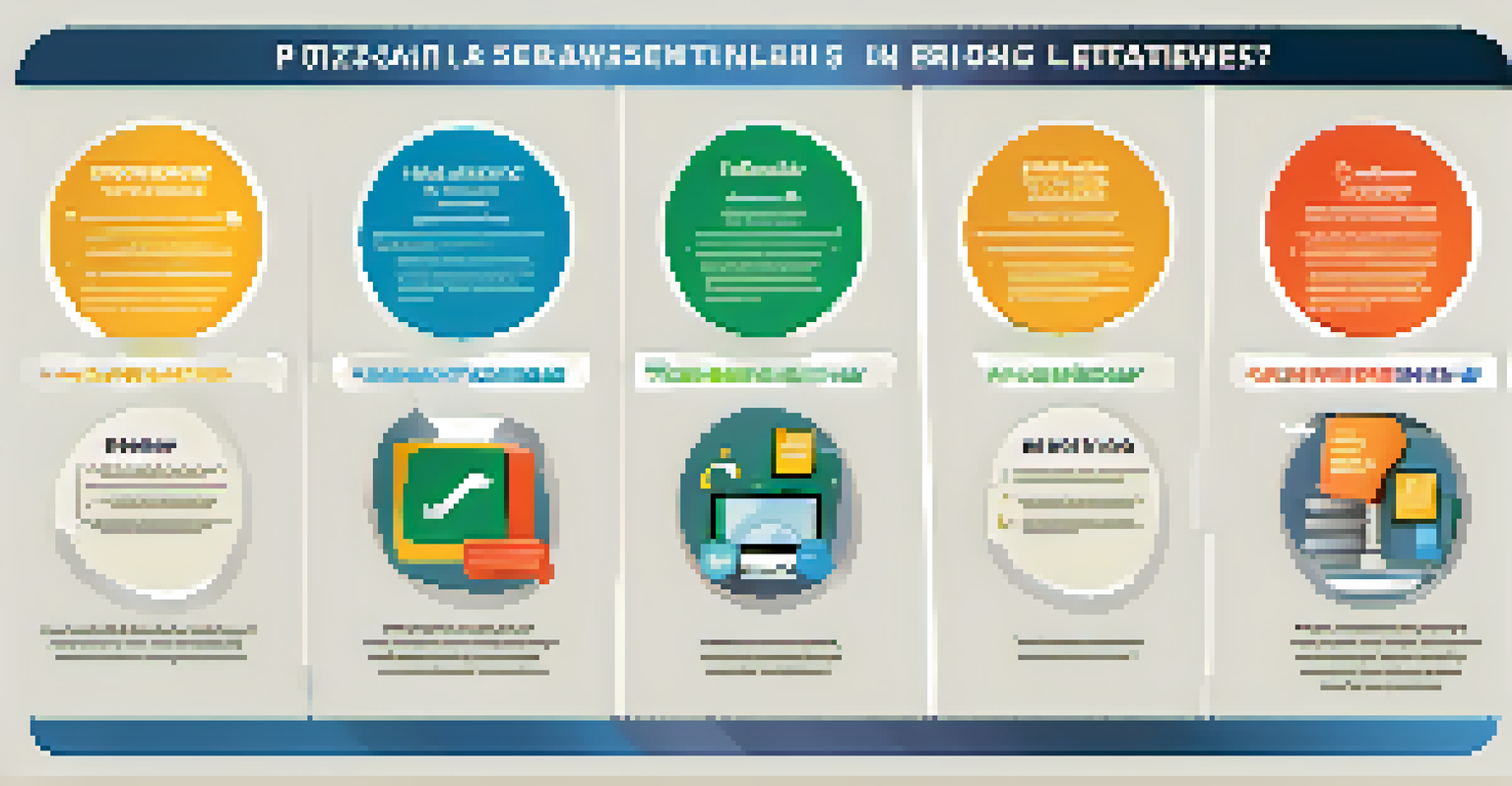Building a Culture of Assessment in Online Learning

Understanding the Importance of Assessment in Online Learning
Assessment in online learning is crucial as it helps gauge student understanding and progress. Without proper assessment, educators may struggle to identify gaps in knowledge, making it difficult to tailor instruction to meet students' needs. By implementing regular assessments, educators can create a dynamic learning environment that promotes continuous improvement.
Assessment is the bridge that connects teaching and learning.
Moreover, assessments help students take ownership of their learning journey. By providing feedback on their performance, students can reflect on their strengths and weaknesses, setting personal goals for growth. This empowerment fosters a sense of responsibility, encouraging students to engage more actively in their education.
Additionally, assessments can enhance communication between students and instructors. When assessments are used effectively, they serve as a bridge, allowing for constructive dialogue about learning objectives and outcomes. This ongoing conversation can build a supportive online community where feedback is welcomed and valued.
Creating Clear Learning Objectives for Effective Assessment
Clear learning objectives are the foundation of effective assessment in online learning. These objectives outline what students are expected to know and achieve, providing a roadmap for both educators and learners. By establishing specific, measurable goals, educators can design assessments that accurately reflect student performance.

For instance, instead of a vague objective like 'understand math concepts,' a clearer goal could be 'solve quadratic equations using the quadratic formula.' This precision not only guides instructional strategies but also helps students focus their efforts on achieving specific outcomes.
Assessments Drive Student Engagement
Regular assessments empower students to take ownership of their learning and actively reflect on their strengths and weaknesses.
Furthermore, when students are aware of the learning objectives, they are more likely to approach assessments with confidence. They understand what is expected of them, which can reduce anxiety and improve performance. This transparency fosters a culture of trust and accountability within the online learning environment.
Incorporating Diverse Assessment Methods for Engagement
Diversity in assessment methods can significantly enhance student engagement in online learning. Rather than relying solely on traditional quizzes and exams, educators can incorporate a variety of formats, such as projects, presentations, and peer reviews. This variety not only caters to different learning styles but also keeps students motivated and invested in their assessments.
Feedback is the breakfast of champions.
For example, group projects can encourage collaboration and communication among students, skills that are vital in today’s workplace. Meanwhile, reflective essays allow students to connect course material to their personal experiences, deepening their understanding and retention of the subject matter.
By mixing up assessment methods, educators can also reduce the pressure associated with high-stakes testing. When students have multiple opportunities to demonstrate their knowledge, they may feel more empowered and less stressed, leading to a more positive online learning experience.
Utilizing Technology for Innovative Assessment Strategies
Technology plays a pivotal role in shaping innovative assessment strategies in online learning. With tools such as online quizzes, discussion forums, and e-portfolios, educators can create interactive and engaging assessments. These technologies not only streamline the assessment process but also provide immediate feedback, which is essential for student growth.
For instance, platforms like Google Forms allow educators to create customizable quizzes that can be easily updated and shared. This flexibility enables instructors to adapt their assessments based on student performance and feedback, ensuring that learning objectives are met effectively.
Diverse Methods Enhance Learning
Incorporating various assessment formats, like projects and peer reviews, caters to different learning styles and keeps students motivated.
Moreover, technology enables formative assessments that can be conducted throughout the learning process. This ongoing feedback loop helps students identify areas for improvement in real-time, encouraging a culture of continuous learning and adaptation.
Fostering a Growth Mindset Through Assessment Feedback
Feedback is a vital component of assessment that can foster a growth mindset among students. When educators provide constructive feedback, they emphasize the idea that abilities can be developed through dedication and hard work. This perspective encourages students to view challenges as opportunities for growth rather than as insurmountable obstacles.
For example, instead of simply marking a paper as 'incorrect,' an educator might highlight areas where the student can improve and suggest resources for further learning. This approach not only helps students understand their mistakes but also motivates them to strive for better results in the future.
Creating a supportive environment where feedback is framed positively can transform how students perceive assessment. When they see assessments as tools for growth rather than just grades, they are more likely to engage deeply with their learning.
Engaging Students in the Assessment Process
Engaging students in the assessment process can lead to more meaningful learning experiences. When students participate in creating assessment criteria or self-assessing their work, they gain valuable insights into their learning journey. This involvement fosters a sense of ownership and accountability, making assessments feel more relevant and personalized.
For instance, educators might invite students to co-create rubrics for projects, allowing them to articulate what they believe constitutes quality work. This collaboration not only empowers students but also aligns assessment with their expectations and understanding of the subject matter.
Feedback Fosters Growth Mindset
Constructive feedback transforms assessments into tools for growth, encouraging students to view challenges as opportunities for improvement.
Moreover, involving students in the assessment process encourages them to reflect on their learning strategies. By assessing their own work, they can identify what methods are effective and what areas need improvement, leading to a deeper understanding of their learning habits.
Continuous Improvement: Evaluating the Assessment Culture
Building a culture of assessment in online learning requires continuous evaluation and improvement. Educators should regularly reflect on the effectiveness of their assessment strategies and seek feedback from students. This iterative process ensures that assessments remain relevant and aligned with learning objectives.
For example, conducting surveys or focus groups can provide valuable insights into student perceptions of assessments. Understanding their experiences can help educators identify what works well and where adjustments are needed, creating a more effective learning environment.

Additionally, staying informed about emerging assessment trends and best practices is essential. By embracing a culture of lifelong learning, educators can continually enhance their assessment methods, ultimately benefiting both themselves and their students.